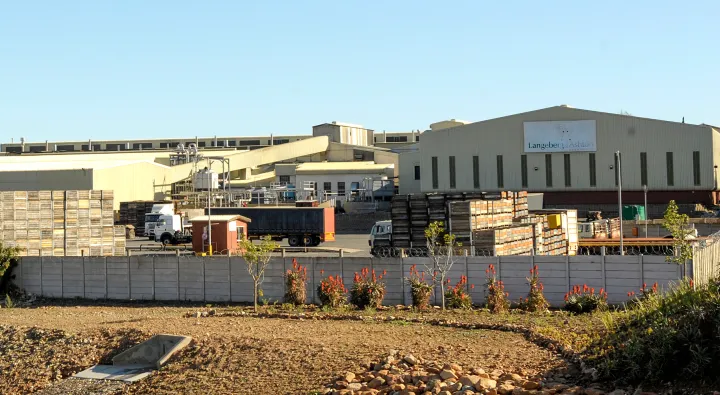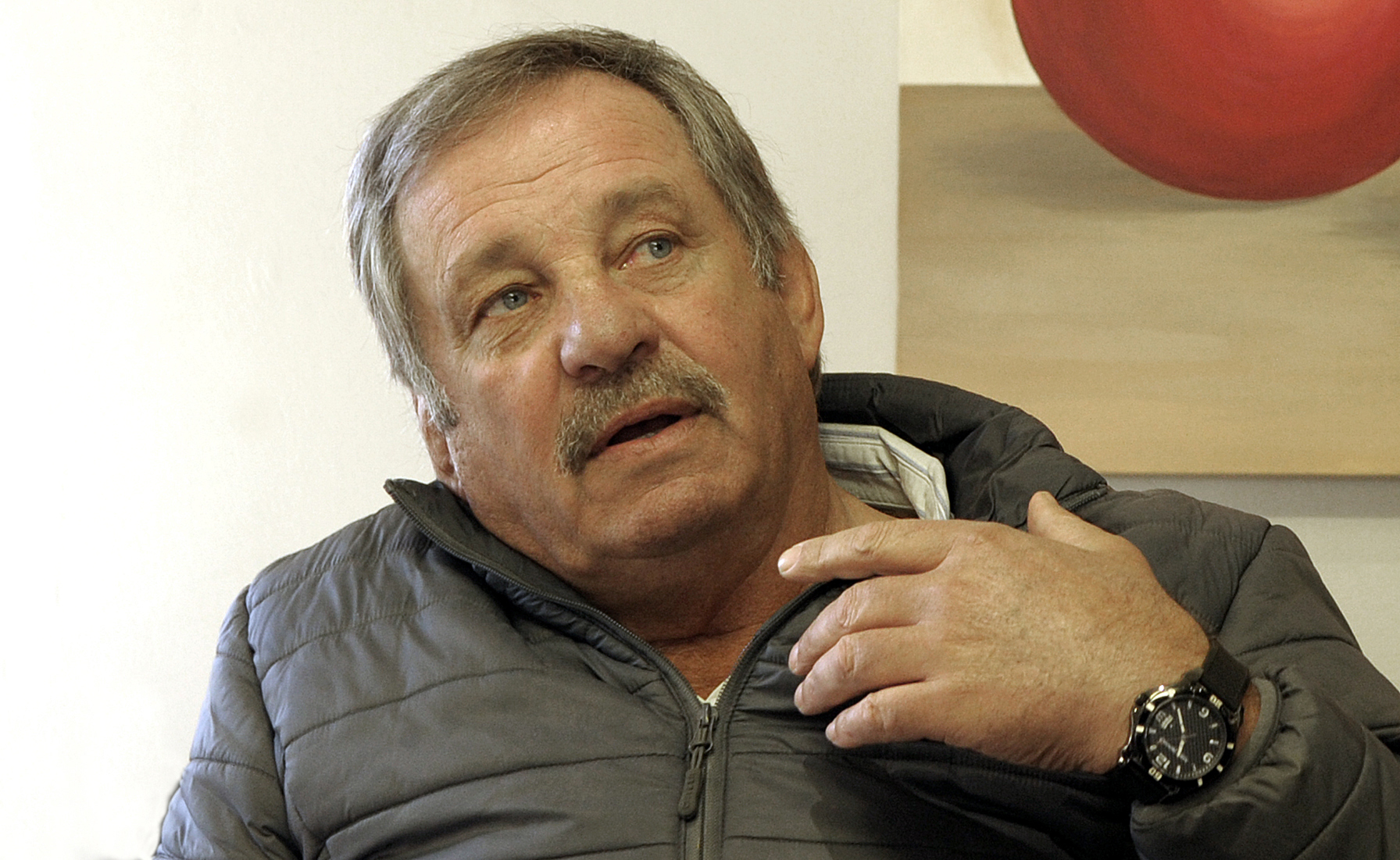LANGEBERG & ASHTON FOODS
Investor sorely needed to save Ashton’s canning factory, avert setback for Western Cape agriculture

The closure of the Langeberg and Ashton Foods canning factory at the end of the 2022/23 season could severely disrupt the agricultural sector in the Western Cape. Local canning producers are optimistic about the possibility of the facility being taken over, but a formal agreement needs to be reached sooner rather than later.
The closure of the Langeberg and Ashton Foods (L&AF) canning plant in Ashton, Western Cape, would have implications for a number of sectors — most notably, agriculture. The plant does not operate in isolation but as part of a logistical and operational network.
Other sectors that stand to be affected are the sugar, packaging and metal industries, according to Christo van der Rheede, executive director of Agri SA.
“Those machines [at the factory] need to be serviced. You need to replace parts. So, it’s not only your factory workers as such, but small businesses that supply services [that will be affected],” he said.

The closure of the Langeberg and Ashton Foods canning factory in Ashton, Western Cape, would have implications for a logistical network of supporting businesses, such as those in the sugar and packaging industries, according to Christo van der Rheede, executive director of Agri SA. (Photo: Facebook)
The factory — which produces canned fruit and fruit puree products — faces one more season of operations under the company, Tiger Brands, before it is either bought or shut down.
Tiger Brands initially announced its intention to exit the deciduous fruit business in May 2020, following a “strategic review” and efforts to “focus on manufacturing, marketing and distributing everyday branded food and beverages”, according to a company statement from 12 July.
Read in Daily Maverick: “Ashton residents face uncertain future as canning plant teeters on the brink of closure”
Due to the lack of a viable buyer, closure looked unavoidable in June this year. However, the plant’s life was extended after a compact was reached between organised labour, L&AF employees and members of the Canning Fruit Producers Association, according to Tiger Brands.
Noel Doyle, Tiger Brands CEO, described the deciduous fruit business as being “subject to the vagaries of weather, exchange rates and global pricing dynamics”. However, the compact “meaningfully contributes to mitigating the risk of significant operating losses [for Tiger Brands] in the forthcoming season”.
For local canning fruit producers, however, the risks associated with the factory’s uncertain future remain high.
Poor profits
Only two canning fruit factories remain in South Africa — the L&AF factory and the Rhodes Food Group factory in Tulbagh, according to Grant Smuts, local farmer and vice-chairman of the Growers Consortium.
The consortium is a collective of canning fruit producers seeking to take over the L&AF factory.
Of the two factories, L&AF is the largest. During the past season, Tiger Brands paid canning fruit producers a fixed price — lower than that paid by its competitors — for produce. This fixed price will remain in place for the coming season, according to Smuts.
“That obviously helps them to make a profit,” he said.

Local farmer and vice-chairman of the Growers Consortium, Grant Smuts.(Photo: Joyrene Kramer)
Tiger Brands has also reduced fruit intake at the factory. The factory used to take in about 76,000 tonnes of peaches in a year, said Smuts. That number had dropped to about 46,000 tonnes in 2020, and around 34,000 tonnes last year.
Maverick Citizen approached Tiger Brands for comment on these issues, but had not received a response at the time of publishing.
“I think [Tiger Brands has] now faced a couple of years of making losses with this factory. And I think that is what their concern is — their shareholders are getting tired of absorbing these losses,” said Mark Barnard, another member of the Growers Consortium.
“We as a group believe that if we can manage [the factory] from Ashton, from here where the factories are situated, we can… turn it around.
“I think we’ve got good people on [Growers Consortium] board, who have also got good experience.”
However, the past few years have placed significant strain on local farmers. Aside from the fixed prices and shrinking market for canning fruit, many producers have been setting aside R1,000 per tonne of produce for the consortium’s owners’ equity, explained Smuts.
More broadly, farmers face high water, electricity and wage costs, as well as skyrocketing prices of fertilisers and insecticides, said Barnard.
Worst case scenario
Between 160 and 220 farmers stand to be affected by the closure of the L&AF factory, according to Smuts. How seriously each will be affected depends on what portion of their business relies on canning fruit.
“The nature of the crop is, it’s a long-term crop. It’s normally anything between 15 and 25 years that an orchard should exist, from planting to removing,” he said.
It takes orchards at least three years to start bearing fruit, and between five and six years to reach full production. They are costly to remove and replace, but the longer it takes to secure the future of the factory, the more farmers may be considering this option.
“I mean, most of the producers are very positive regarding the buyout of the company, if we can, but the longer it takes, the more negativity there is. Because… you have to make decisions, that is the problem. You have to decide [if you are] going to prune, for instance, because nobody wants to put in costs if you’re not going to get anything out,” said Barnard.
If too many farmers decide to remove their canning fruit crops, the industry could collapse.
“We’re working, as a consortium, on roughly 70,000 tonnes of peaches, and that is what we need for this factory to run optimally. If it goes to, like, 50,000 tonnes, then we are not running optimally and we will not be able to… recover the overheads that we are bargaining on.”
If the factory were to close, the problem for farmers then becomes which crop to replace the orchards with, in a sector where most producers are facing similar challenges.
“If everyone here decides they are going to take out canning fruit… and they’re going to plant wine grapes, you know how bad that’ll be for the wine industry?” said Barnard.
“We are already sitting with a surplus in dry white wine in the wine industry. If you [change] 2,000 hectares of peaches into wine grapes, in two years’ time, that problem could be exponentially larger. So, whatever happens, it will also have an effect on other industries in the area.”
Citrus and plum producers are also facing reduced prices for their produce, according to Smuts.
Securing the factory’s future
Allowing the L&AF factory to close is not an option, according to Jacques Jordaan, CEO of the Canning Fruit Producers Association. There is a need to “get a plan on the table” and consolidate all efforts and interest from potential investors.
“[Tiger Brands] has prerequisites, so they want to see that there’s enough money on the table, and the ability to run the factory,” said Jordaan.
The Growers Consortium is seeking an investment partner with which to buy the plant. This is an important step in ensuring there is working capital to sustain the business after a takeover.
“We need equity partners because this is all about… a big amount of capital which is required for the running costs,” explained Smuts.
“You’ve got to put up a lot of money and then use that money to pay for your products. But then [the products] go into store… over an 18-month period before you receive anything back for it again. So, it’s a big investment which stands in warehouses for a time.”
Smuts is of the view that a more producer-driven approach to running the factory could result in better profit margins.
“We felt that there are quite a few other commodities that we could consider, to also put through some or other formal process… and we felt that there are certain sections of the business model which we can change from a corporate model to a different model, where… there’ll be profit in it for us,” he said.
Barnard considers the canning industry to be a stable one, even if there are some accounts of the worldwide industry shrinking in recent years.
“We as a country are a very small percentage of the world market. We have very unique products — it’s almost like niche products — and I believe that even in a shrinking world industry, we can still expand the South African portion of that,” he said. DM/MC



















 Become an Insider
Become an Insider
South Africa must have a greater need for canned products as they preserve food without the need for refrigeration. Could excess capacity be used for cheaper protein foods?
Some thoughts: This may be a perfect investment opportunity for the PIC. Also, this may be an ideal case for a cooperative business model implementation. Tiger Brands could perhaps be encouraged to leave an updated plant behind and not charge for it.
That “strategic review” by Tiger whilst never spoken out aloud would no doubt have noted that the canned fruit industry was never a good fit in the mother company which specialises in high profit margin, super refined foods like mealie meal.
The fruit industry, despite all the sugar in canned fruit, is a product with super high nutrient values that have not been extracted and sold off to a third party for extra profit.
Are workers and particular management prepared to take a cut in salary to save the factory and find a willing buyer until the new company finds its feet? L&AF must surely not be allowed to fail.
We can bet our boots there will be Chinese companies lining up to buy it out and SA continues to sell off the family silver.